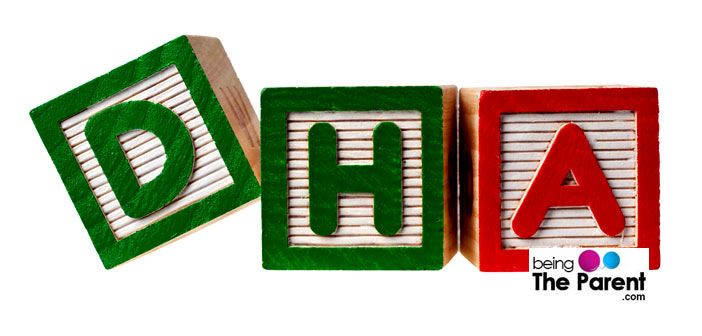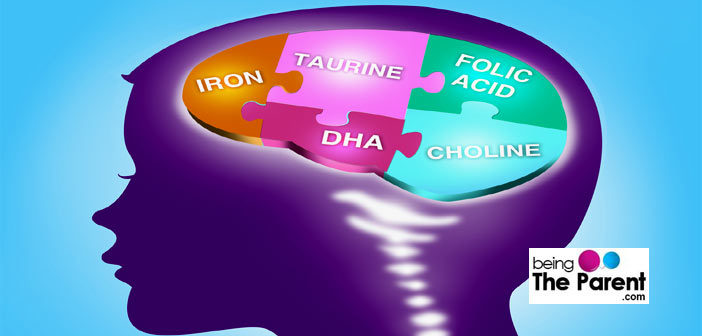You must have come across a number of children’s health drink advertising about ‘DHA’ and brain development. Complan, Horlicks, and many other brands etc., claims to have DHA and term it as a highly essential mineral for your child’s overall growth and development. But have you wondered why all these print and TV ads on children health drinks stress on DHA? Whether it is an advertising gimmick or has some truth and fact to it? Here is our take on DHA and your child’s development.

- What Is DHA?
- Does DHA Help In Brain Development?
- DHA And Child Brain Development
- What Are The Benefits Of DHA For Children?
- What Are The Sources of DHA?
- Omega-3 Fats and Pregnancy
- Why Is DHA Important?
- DHA In Second Trimester Of Pregnancy
- DHA And Breastfeeding
- How Does Low DHA Level Affect Adults?
What Is DHA?
DHA, known as docosahexaenoic acid is a type of omega-3 fat present in high quantities in the cold water fishes such as cod liver oil, salmon, halibut, mackerel, seal blubber and whale blubber. This healthy omega-3 fat or DHA is widely used for promoting mental development and is a constituent of baby foods. DHA represents about 97 percent of all omega-3 fats in the brain and 93 percent of all omega-3 fats in the retina in the eye. Often it is used along with arachidonic acid for promoting better mental development.
Does DHA Help In Brain Development?
Human brain requires omega-3-fatty acid and DHA is polyunsaturated omega-3-fatty acid, so it is a key component of brain tissue. 60 percent of the brain is made up of fat, and DHA constitutes about 15 percent to 20 percent of your brain’s structural support. Now, since the human brain is basically built with fat, it is but simple understand that omega-3 fats plays an integral role in the functions of the brain. Scientific studies have proved the usefulness of DHA for all-be it infants, adults or pregnant ladies. DHA is important for brain and eye development and functions throughout the life stages, but is particularly important during the first two years of life and early childhood.
Brain and eye development is influenced by fats in either ends of one’s life-during infancy and in the elderly phase of life. During these two phases the brain is sensitive to nutrition. DHA is needed by both growing and aging brain for proper functioning.

DHA And Child Brain Development
To boost your child’s brain performance, consumption of this healthful fat is a must. Since fat accounts for about 60 percent of brain and the nerves controlling other systems of the body, therefore fats should be included in your diet in good amount. To improve the brain and the eye function and to have have geniuses, you need to ensure that your children eat the right kind of fat-DHA.
Brain is the master or chief gland controlling the entire body system and instructing the functioning of the body by sending chemical messengers. Prostaglandins are important group of chemical messengers. They are omega-3-fatty acid found in flax seed oil, pumpkin oil, cold water fish, and walnut oil.
What Are The Benefits Of DHA For Children?
From birth till about 5 years of age, your child’s brain increases approximately 3.5 times in mass. This is the time when rapid growth of brain and eye development takes place, hence it is important that children consume adequate amounts of DHA in their diet to support this period. DHA helps in supporting and improving a child’s normal cognitive function, brain and eye development and a healthy heart. Besides this DHA is also effective in curing CAD (coronary artery disease) ADHD(attention deficit-hyperactivity disorder), dementia diabetes type 2, improving night vision and depression. DHA along with EPA (eicosapentaenoic acid) is useful in preventing heart ailments, asthma, dysmenorrheal, lung diseases and kidney diseases.

What Are The Sources of DHA?
Animal sources of DHA are not consumed by everyone, and the fact that DHA is not produced by our body makes it all the more essential to include the intake of foods that have DHA. Some widely available sources of DHA are:
- Flaxseeds and Chia Seeds
- Walnuts
- Sardines
- Salmon
- Beef
- Soya beans
- Shrimps
- Tofu
- Brussels sprouts
Omega-3 Fats and Pregnancy
The statement ‘You are what you eat’ is absolutely correct.
Nutrition plays a crucial role during pregnancy. Your food is important not only for your health, but also the growth and development of your baby. Pregnancy diet should be enriched with essential nutrients such as folic acid, iron, calcium and other important vitamins. DHA or omega-3 fats should be added in the diet in sufficient amount. Docosahexaenoic acid is an important brain food and is needed for maintaining the health of the brain and eye. You wait so anxiously to see how your baby looks like when he/she is born, you can be sure of giving him good brain by taking sufficient amount of DHA in your diet.
Why Is DHA Important?
DHA or omega-3 fatty acids are absolutely important for everyone, owing to their benefits for a healthy brain and eyes. Since the body cannot produce essential omega-3 fats, you have to make an effort to get the DHA from your diet. Take care of what you and your baby eats. Food obviously is the most important part of your health. Incorporate all the essential components such as vitamins, minerals, etc. to meet all the requirements of your body and the tenacious body of your baby.

DHA In Second Trimester Of Pregnancy
Most of the baby’s brain growth occurs in the second trimester of pregnancy and during first two years after birth. This is the period when you need DHA the most. Though you should eat healthy all the three trimesters of pregnancy, yet getting optimum DHA is crucial during the second trimester. Various studies have shown that DHA supplementation given during pregnancy can enhance the mental development in children and can improve psychomotor development like hand-eye coordination and better attention skills.
DHA And Breastfeeding
While it is you who caters to your unborn baby’s requirement of DHA by eating fish meat etc, Nature has enriched your breast milk with good quantities of DHA so you need not worry while nursing the baby about the DHA. Pregnant and lactating mothers should consume 60 to 80 mg of DHA every day. This shows that DHA is an important and essential supplement for expectant mothers.
Scientists believe and advocate that DHA should be given to unborn babies along with their DNA. It is ‘that’ essential.
How Does Low DHA Level Affect Adults?
Memory loss and Alzheimer’s disease have been found to affect adults who have low DHA levels. In order to prevent brain and mental degeneration, DHA must be made an essential part of your diet as you age. Hence DHA is not only crucial during brain development ages but also during old age.
Ask your nutritionist about the daily requirement of DHA and foods containing it. Make a diet plan and eat accordingly. Stay healthy and stay fit.
Happy parenting!

